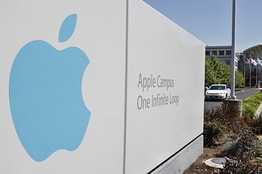(单词翻译:单击)

Apple's move to transfer some production back to the U.S. has been in the headlines, but that doesn't mean the iPhone maker is scaling down its China operations. In fact, it's still expanding.
苹果公司(Apple Inc.)将部分生产线转回美国本土一直是媒体广为报道的话题,但这并不意味着这家公司准备削减中国业务的规模,实际上,苹果依然在拓展中国市场。
The Wall Street Journal reported Monday that Apple is poaching engineers from rival smartphone maker HTC and other Taiwanese tech firms, to build up its teams in Shanghai and Taipei.
《华尔街日报》周一报道称,苹果正从竞争对手宏达国际电子股份有限公司(HTC Co. 简称:宏达国际)和其他台湾科技公司挖工程师,来扩大自己在上海和台北的团队。
The move is a reminder of the realities of globalization and the current limitations of factory automation. Industry executives and analysts agree that costs for robotic arms have to come down quite a bit before it would be cost-efficient to switch en masse to automated assembly lines for devices like smartphones and tablets. Until that happens, building an iPhone remains a labor-heavy process that is likely to stay in countries with cheaper labor such as China.
苹果此举提醒人们注意到有关全球化的现实以及目前工厂自动化所面临的局限性等问题。行业高管和分析师都认为,对智能手机和平板电脑等设备来说,只有将机械臂的成本大大降低,再进行装配线全面自动化才能产生成本效益。在实现这一点之前,生产iPhone依然是一个非常需要人力的过程,因此生产线可能会留在中国等劳动力成本较为低廉的国家。
'Automation has its limitations,' said Arthur Hsieh, lead analyst for UBS Asia technology hardware. 'A product has to have a long life cycle to be suitable. And if demand is very volatile, then manual production makes more sense.'
瑞银(UBS)亚洲科技行业分析师谢宗文(Arthur Hsieh)称,自动化有其局限性,具有较长生命周期的产品才适合生产自动化,而且如果需求波动很大的话,人工生产线更合适。
Apple's Mac Pro computers were a prime candidate for automation, with their long life cycles and relatively stable demand, which meant the same production line could be used for a long time without requiring an overhaul. The company brought some Mac Pro production lines back to the U.S. this year following political pressure to reduce reliance on China-based contract manufacturers who have come under fire for labor practices.
苹果生产的Mac Pro电脑是最适合生产自动化的一个产品,该产品的生命周期长,需求相对稳定,这意味着一条生产线可以使用很长时间而无需全面更新。苹果今年将Mac Pro的部分生产线转回了美国本土,主要原因是受到政治方面的压力,要求该公司降低其对位于中国的代工制造商的依赖,这些制造商屡屡因劳工实践的问题受到批评。
But the bulk of Apple's products can't be adapted to automated assembly lines quite so easily. All of Apple's iPhones and iPads are still assembled in China, and are not likely to move out in the near-term, analysts say.
然而苹果大部分产品没有那么容易就可以适应自动化的装配线。分析师称,所有iPhone和iPad依然是在中国组装的,这些装配线短期内不会离开中国。
Which brings us to engineers. Apple's close cooperation with suppliers to develop new products means that it is wedded to its supply chain in China. It needs engineers and managers on the ground to continuously monitor developments at its component suppliers and manufacturers. And as it plans a wider array of products, it needs more engineers in China than ever before and has been aggressively trying to hire them in Shanghai and Taipei.
这时就需要工程师上场了。苹果和供应商之间就开发新产品所开展的密切合作意味着该公司是和中国的供应链绑在一起的。苹果需要在中国聘请工程师和管理人员持续监控配件供应商和制造商的工作情况。此外,该公司还计划扩大产品范围,因此比任何时候都更需要在中国聘用更多工程师,上海和台北的招聘人数尤为多。
That's why manufacturing jobs aren't the only ones that may be difficult to move back to the U.S.
这就是为什么制造业的岗位不是唯一难以转回到美国本土的岗位的原因。


